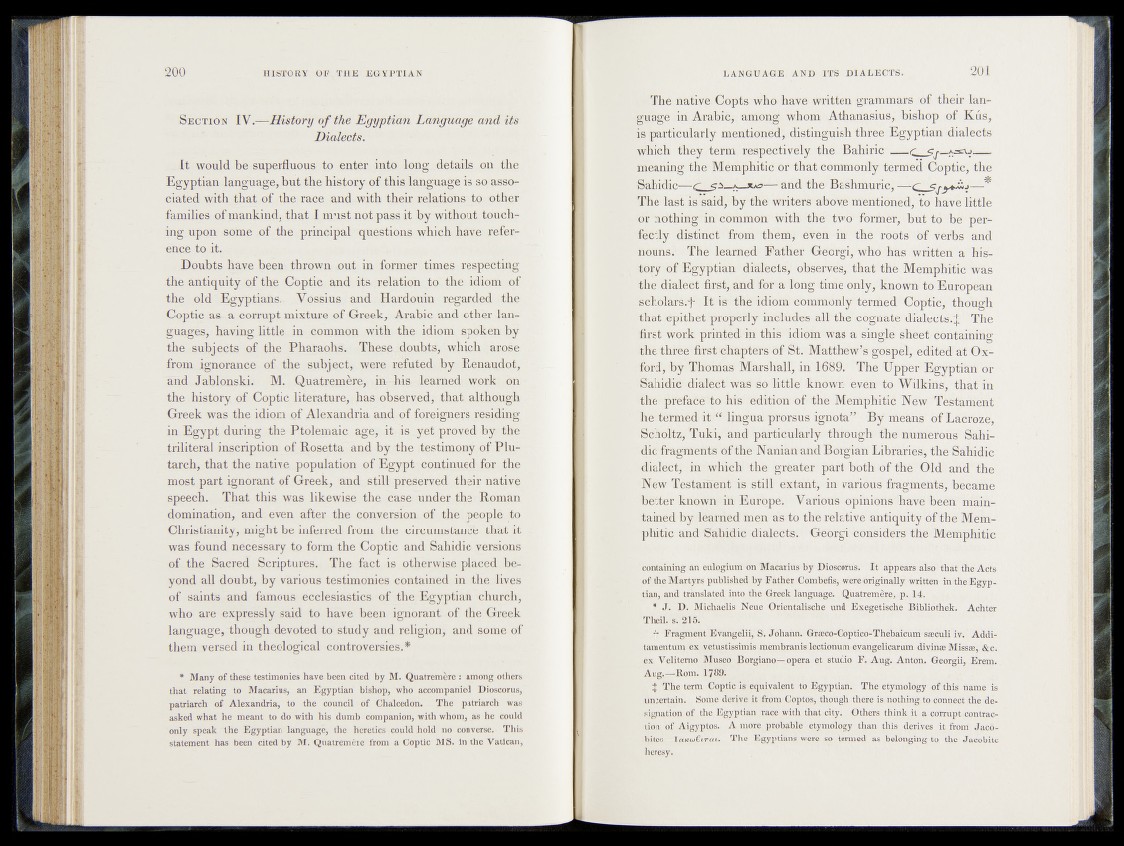
Section IV.—History of the Egyptian Language and its
Dialects.
It would be superfluous to enter into long details on the
Egyptian language, but the history of this language is so; associated
with that of the race and with their relations to other
families of mankind, that I must not pass it by without touching
upon some of the principal questions which have reference
to it.
Doubts have been thrown out in former times respecting
the antiquity of the Coptic and its relation to the idiom of
the old Egyptians. Vossius and Hardouin regarded the
Coptic as a corrupt mixture of Greek, Arabic and other languages,
having little in common with the idiom spoken by
the subjects of the Pharaohs. These doubts, which, arose
from ignorance of the subject, were refuted by Renaudot,
and Jablonski. M. Quatremere, in—his: learned work , on
the history, of Coptic literature, has observed, that although
Greek was the idiom of Alexandria and of foreigners residing
in Egypt during the Ptolemaic age, it is yet proved byj the
triliteral inscription of Rosetta and by the testimony of Plutarch,
that the native population of Egypt continued for the
most part ignorant of Greek, and still preserved their native
speech. That this was likewise the case under the Roman
domination, and even after the conversion, of the people to
Christianity, might be inferred from the circumstance that it
was found necessary to form the Coptic and Sahidie versions
of the Sacred Scriptures. The fact is otherwise placed be-,
yond all doubt, by various testimonies contained in the lives
of saints and famous ecclesiastics of the Egyptian church,
who are expressly said to have been ignorant of the Greek
language, though devoted to study and religion, and some of
them versed in theological controversies.*
* Many of these testimonies have been cited by M. Quatremere : among others
that relating to Macarius, an Egyptian bishop, who accompanied Dioscorus,
patriarch of Alexandria, to the council of Chalcedon. The patriarch was
asked what he meant to do with his dumb companion, with whom, as he could
only speak the Egyptian language, the heretics could hold no converse.- This
statement has been cited by M. Quatremere from a Coptic MS. in the Vatican,
201
The native Golpts who have writteu grammars of their language
vin Arabic,s am|oug Athanasius, .'bishop of Kus,
is particularly meptionedy distinguish threes Egyptian dialects
which they term, r^pecfiveiy,*$he 'Bahiric__c <ƒ—x=cu__
ha'eaning thgfVLemphitic oridh'afk^hmonl^terffied Coptic, the
Sahidie—c o _ a—x*o—and the Bashmuric, — —*
The last is said, by the writers aboVe mentiotie®^ to1 Have little
ibr nothing in common with the"'twds former, ‘ but td^bWpdri-
fectly distinct from them,1 even'ritf 'the rrbots 6f verbs and
nouns. The learned Father Gddr-gij whdl has vriitteri a history
of Egyptian dialects,1 observes, that fthe MethjphiticPwas
the dialect firitj and for a long tinie^hl^knoWn- I^E&ropean
' scholarslf' It is the idiom commonly termed ' Coyptic, though
that Epithet properly includes alb tnc.i^^nSte’ The
first w’ork printed in this idiom was a singlfi §h%feWc6ritain^ag^
-the three first chapters of St. Matthew’^ g^&peb,'edited at Oxford,
by Thomas Marshall, in 1689. The UpJjfer Egyptiari or
1 Sahidicbdialect was sd little*known1 evem'to Wilkins1,!rih.if Tn
the" prefaceTto his edition of the Memphitic ’New Testament
he termed it' “ lingua prorsus ignota” R^^^pS^wf Lacro'ze,
Scftoltz, Tuki, and particularly through the nuifierou# Sahi-
’'-dic fragments of the Nanian and Borgiari Libraries, the Sahidie
dialect] in which the greater part both of the Old and the
^New Testament is still extant, in various fragments, became
better known in Europe. Various opinions' have been maintained
by:learned men as to the relative antiquity oftthe Mem-
phitic and Sahidie dialects. Georgi considers the Memphitic
containing an eulogium on Macarius by Dioscdruis. It appears also; that the Acts
of the Martyrs published by Father Combefis, were.originally written in||^Egyp-
tian, and translated into the Greek language. Quatremere, p. 14.
* J. D. Michaelis Neue Orientalische und Exegetische Bibliothek. A.chter
Theil. s. 215.
t Fragment Evangelii, S. Johann. Grasco-Coptico-Thebaicum saeculi iv. Addi-
tamentum ex vetustissimis membranis lectionum evangelicarum divinae MisSae, &c.
ex Velitemo Mnseo JBorgiano—opera et studio F. Aug. Anton. Georgii, Erem.
Aug.—Rom. 1789;
$ The term Coptic is equivalent to Egyptian. Tbe etymology of this name is
Uncertain. Some deriye it from Coptos, though there is nothing to connect thede-
I signation of the Egyptian race with that city. Others think it a corrupt contraction
of Aigyptos. A more probable etymology than this derives it froni Jacb-
.bites—Iaicwfirai. The Egyptians were so lermed as belonging to the Jacobite
heresy.